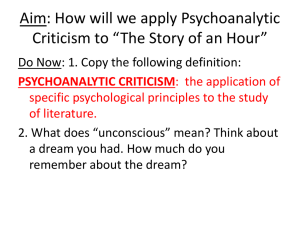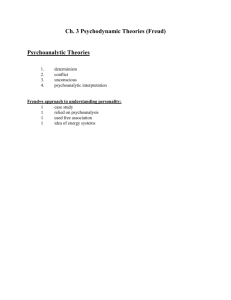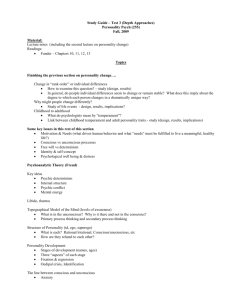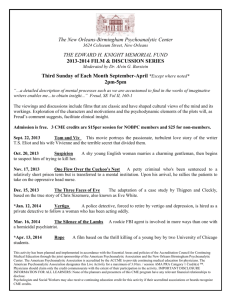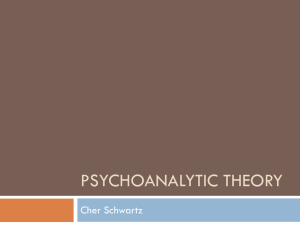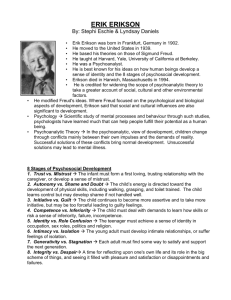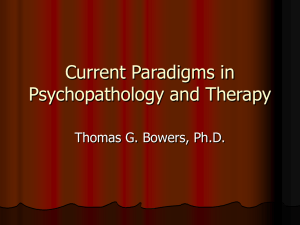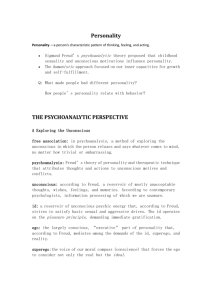Abnormal Psychology
advertisement
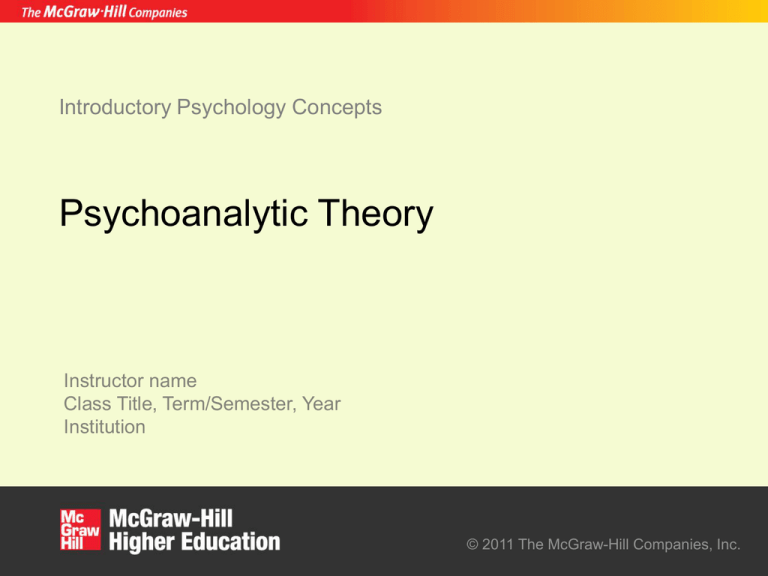
Introductory Psychology Concepts Psychoanalytic Theory Instructor name Class Title, Term/Semester, Year Institution © 2011 The McGraw-Hill Companies, Inc. Introductory Psychology Concepts: Psychoanalytic Theory Psychoanalytic Theory The first formal theory of personality was advanced by Sigmund Freud in the early years of the 20th century, and it is the prototype of the psycho-dynamic approach. Freud’s Model of Personality Conscious Immediate awareness of current environment Available to awareness Preconscious (e.g., names of friends, home address) Unconscious 2 © 2011 The McGraw-Hill Companies, Inc. Unavailable to awareness (infantile memories, repressed wishes and conflicts) Introductory Psychology Concepts: Psychoanalytic Theory Psychoanalytic Theory Freud was convinced that an unconscious part of the mind exerts great influence on behavior. • Conscious mind: Consists of mental events in current awareness. • Preconscious mind: Contains memories, thoughts, feelings, and images that we are unaware of at the moment but that can be recalled (a friend’s telephone number). • Unconscious mind: A dynamic realm of wishes, feelings, and impulses that lies beyond our awareness. 3 © 2011 The McGraw-Hill Companies, Inc. Introductory Psychology Concepts: Psychoanalytic Theory Basic Elements of Psychoanalytic Theory Dream Interpretation Examining dreams to find clues to unconscious conflicts and problems. Free Association Patients are asked to say aloud whatever comes to mind, regardless of its apparent irrelevance or senselessness. Analysts attempt to recognize and label the connections between what a patient says and the patient’s unconscious. Resistance Inability or unwillingness to discuss or reveal particular memories, thoughts, or motivations. Positive and Negative Transference The transfer of feelings to a psychoanalyst of love or anger that had been originally directed to a patient’s parents or other authority figures (Mann, 1997; Gordon, 2000; Van Beekum, 2005). 4 © 2011 The McGraw-Hill Companies, Inc. Introductory Psychology Concepts: Psychoanalytic Theory Psychoanalytic Theory: Neo-Freudians Neo-Freudian psychoanalysts disagreed with certain aspects of Freud’s thinking. • They believed that Freud did not give social and cultural factors a sufficiently important role in the development and dynamics of personality. • Also believed that Freud laid too much emphasis on the events of childhood as determinants of adult personality. 5 © 2011 The McGraw-Hill Companies, Inc. Introductory Psychology Concepts: Psychoanalytic Theory Psychoanalytic Theory: Neo-Freudians Erik Erikson • Believed that personality development continues throughout the life span as individuals confront challenges that are specific to particular phases in their lives. Alfred Adler • Insisted that humans are inherently social beings, motivated by social interest, the desire to advance the welfare of others. Carl Jung • Believed that humans possess a personal unconscious and also a collective unconscious. 6 © 2011 The McGraw-Hill Companies, Inc. Introductory Psychology Concepts: Psychoanalytic Theory Psychoanalytic Theory: Neo-Freudians Karen Horney • One of the earliest psychologists to champion women’s issues, sometimes called the first feminist psychologist. • Suggested that personality develops in the context of social relationships and depends on the relationship between parents and child and how well the child’s needs are met. • Rejected Freud’s suggestion that women have penis envy, asserting that what women envy most in men is not their anatomy but the independence, success, and freedom that women are often denied (Horney, 1937; Miletic, 2002). 7 © 2011 The McGraw-Hill Companies, Inc.
